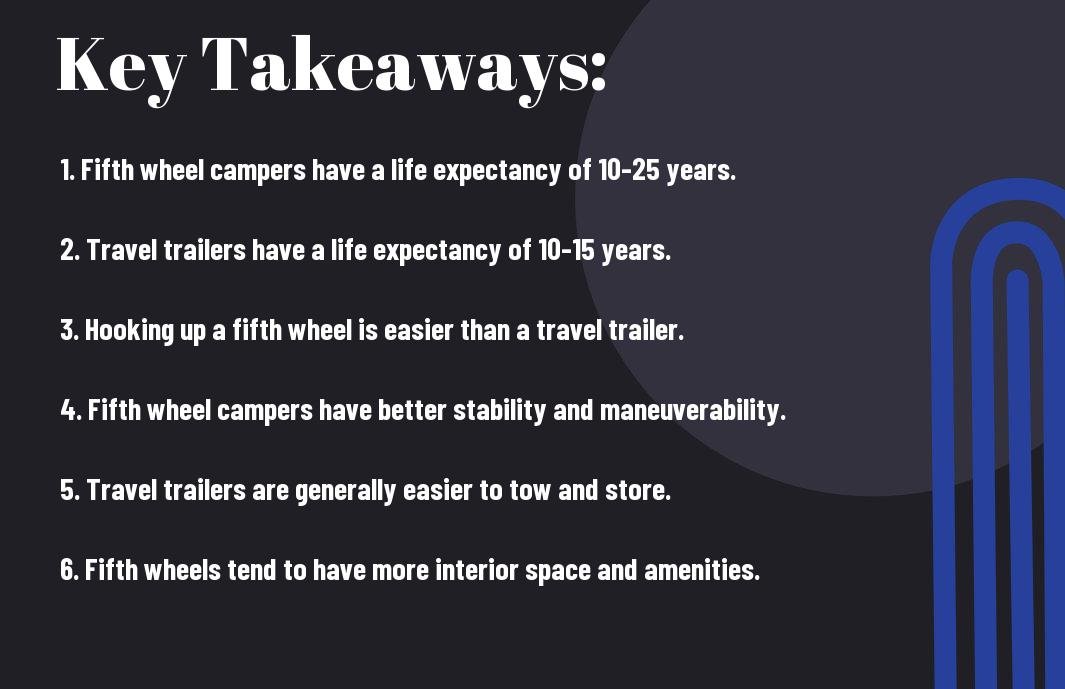If you’re considering investing in a fifth wheel camper, one of the first questions you may have is about its life expectancy. You’ll be glad to know that the average life expectancy of a fifth wheel camper is around 10-15 years, though this can vary depending on factors such as maintenance and usage. Now, when it comes to ease of hooking up, a fifth wheel is often easier to maneuver and connect compared to a travel trailer. The unique design allows for better stability and control during the hookup process, making it a popular choice for many RV enthusiasts.
Key Takeaways:
- Life Expectancy: The life expectancy of a fifth wheel camper can vary depending on maintenance, usage, and environmental factors. With proper care, a fifth wheel can last for many years.
- Maintenance: Regular maintenance, including inspections of the roof, brakes, tires, and electrical systems, can help extend the life expectancy of a fifth wheel camper.
- Hookup Ease: Many find that hooking up a fifth wheel is easier than a travel trailer due to the direct connection to the towing vehicle and the overall stability during travel.
- Turning Radius: Fifth wheels have a tighter turning radius compared to travel trailers, making them easier to maneuver in tight spaces and while backing up.
- Towing Capacity: The towing capacity required for a fifth wheel is typically higher than that of a travel trailer, so it’s important to ensure your vehicle can safely tow the camper.
- Luxury and Space: Fifth wheels often offer more luxurious amenities and additional living space compared to travel trailers, making them a popular choice for long-term camping or full-time living.
- Cost: While fifth wheels can initially have a higher price tag than travel trailers, they may provide better value over time due to their longevity and comfort features.

Life Expectancy of Fifth Wheel Campers
One of the most frequently asked questions by prospective fifth wheel camper owners is about the life expectancy of these vehicles. It’s an important consideration when making a significant investment in a recreational vehicle. Understanding the factors that can affect the longevity of a fifth wheel camper can help you make an informed decision.
Factors Affecting Fifth Wheel Longevity
There are several factors that can impact the life expectancy of a fifth wheel camper. These include the quality of construction, how well the camper is maintained, the type of climate it is exposed to, the frequency of use, and the driving habits of the owner. Proper maintenance is crucial to extending the lifespan of a fifth wheel camper. Regular inspections, addressing any wear and tear promptly, and keeping up with maintenance schedules are all essential. Exposure to extreme weather conditions and long periods of inactivity can also affect the structural integrity of the camper. Additionally, careless driving habits, such as excessive speed and abrupt maneuvers, can lead to premature wear and tear. Therefore, it’s important to be mindful of how you operate and treat your fifth wheel camper.
- Quality of construction
- Maintenance
- Climate and storage
- Frequency of use
- Driving habits
Though some of these factors may be beyond your control, being proactive in addressing them can greatly influence the longevity of your fifth wheel camper.
Average Lifespan Estimates
When it comes to the average lifespan of a fifth wheel camper, there are several variables to consider. With proper care and maintenance, a well-built fifth wheel camper can last anywhere from 10 to 20 years. However, this estimate can vary significantly based on the aforementioned factors. Neglecting maintenance, exposing the camper to harsh environments, and poor driving habits can shorten its lifespan considerably. On the other hand, if you take good care of your fifth wheel camper and follow best practices for upkeep, you can expect it to serve you well for many years to come.
Connecting Fifth Wheel Campers vs. Travel Trailers
Keep in mind that both fifth wheel campers and travel trailers have their own unique hook-up processes. Understanding the differences can help you determine which option to choose based on your specific needs and preferences. We will examine the hook-up process for both types of campers to give you a better idea of what to expect.
Fifth Wheel Hook-up Process
When it comes to connecting a fifth wheel camper, the process is generally considered to be easier and more stable compared to a travel trailer. The hitch is located in the bed of the truck, which provides greater stability and maneuverability. You simply back the truck up to the camper, lower the hitch onto the pin, and secure it in place. This design allows for tighter turns and overall easier towing, making it a popular choice among RV enthusiasts. However, it’s important to ensure that the hitching mechanism is properly locked and secured to prevent any accidents on the road.
Travel Trailer Hook-up Process
On the other hand, connecting a travel trailer requires a bit more finesse and patience. You need to align the ball hitch on the back of your towing vehicle with the coupler on the trailer and then lower the trailer until it’s secure. This process may involve some trial and error, especially if you’re new to towing a travel trailer. Additionally, the hitch is located at the rear of the towing vehicle, which can impact maneuverability and make tight turns more challenging. It’s crucial to double-check that the hitch is properly secured before hitting the road to avoid any mishaps during travel.
Comparing Ease of Hook-up
After looking at the general process of hooking up both a fifth wheel and a travel trailer, it’s clear that there are some noticeable differences in terms of ease and convenience. Here’s a breakdown of the equipment and effort required for each type of camper:
| Fifth Wheel | Travel Trailer |
| Requires a specialized hitch that mounts in the bed of a pickup truck | Utilizes a standard hitch that attaches to the rear of a tow vehicle |
| Back-up assistance may be needed to align the hitch and pin box | Can be maneuvered into place by one person using a hitch jack |
| May involve heavier lifting due to the weight of the hitch and pin box | Generally lighter and easier to manage when connecting to the tow vehicle |
Equipment Differences
When it comes to the equipment required for hooking up a fifth wheel versus a travel trailer, you’ll find that the fifth wheel necessitates the use of a specialized hitch that mounts in the bed of a pickup truck, while a travel trailer utilizes a standard hitch that attaches to the rear of a tow vehicle. Additionally, the fifth wheel may require back-up assistance to align the hitch and pin box, while the travel trailer can often be maneuvered into place by one person using a hitch jack.
Skill and Effort Required
As you consider which type of camper might be easier for you to hook up, it’s important to note that the fifth wheel may involve heavier lifting due to the weight of the hitch and pin box. On the other hand, the travel trailer is generally lighter and easier to manage when connecting to the tow vehicle. Keep in mind the physical effort required and your comfort level with maneuvering the equipment as you make your decision.
Maintenance Tips to Extend Lifespan
To ensure the longevity of your fifth wheel camper, it is crucial to implement regular maintenance. By taking the time to properly care for your RV, you can extend its lifespan and avoid costly repairs. Here are some essential maintenance tips to keep in mind:
- Inspect and maintain the roof and seals regularly to prevent water damage.
- Keep the slide-out seals clean and lubricated to prevent leaks and damage.
- Check and service the wheel bearings and suspension to ensure smooth and safe towing.
- Regularly inspect and clean the awning to prevent mold and deterioration.
- Test the electrical and plumbing systems regularly to catch any issues early.
Any signs of wear and tear or damage should be addressed promptly to prevent further complications and prolong the life of your fifth wheel camper.
Preventative Maintenance for Fifth Wheel Campers
When it comes to fifth wheel campers, preventing issues before they arise is key to maintaining the longevity of your RV. Regularly inspecting the roof, seals, slide-outs, wheel bearings, suspension, awning, and internal systems can help you catch and address any potential problems early on. By staying proactive and performing preventative maintenance on your fifth wheel camper, you can keep it in top condition for years to come.
Best Practices for Travel Trailers
For travel trailers, adhering to best practices can help you preserve the lifespan of your RV. Regularly inspecting and maintaining the roof, seals, axles, hitch, electrical, and plumbing systems is crucial to ensuring the long-term functionality of your travel trailer. By taking the time to care for your RV and following best practices, you can minimize the risk of costly repairs and enjoy its benefits for years to come.
Conclusion
So, when it comes to the life expectancy of a fifth wheel camper, it ultimately depends on how well you maintain and care for it. With regular maintenance and proper care, a fifth wheel camper can last for many years. As for the ease of hooking up, a fifth wheel is generally easier to attach and detach compared to a travel trailer. The hitch is located in the bed of your truck, providing better maneuverability and a more stable towing experience. Overall, both types of campers have their own advantages, so it really comes down to personal preference and your specific towing needs.
FAQ
Q: What is the typical life expectancy of a fifth wheel camper?
A: The life expectancy of a fifth wheel camper can vary based on factors such as maintenance, usage, and overall care. With proper upkeep and regular maintenance, a fifth wheel can last for 10-20 years or even longer.
Q: Which is easier to hook up, a fifth wheel or a travel trailer?
A: Generally, many people find fifth wheels easier to hook up compared to travel trailers. This is because fifth wheels attach to the bed of a pickup truck, which can provide better stability and maneuverability during the hookup process. Additionally, the unique hitch design of a fifth wheel can make hitching and unhitching a simpler and more intuitive process compared to travel trailers.
